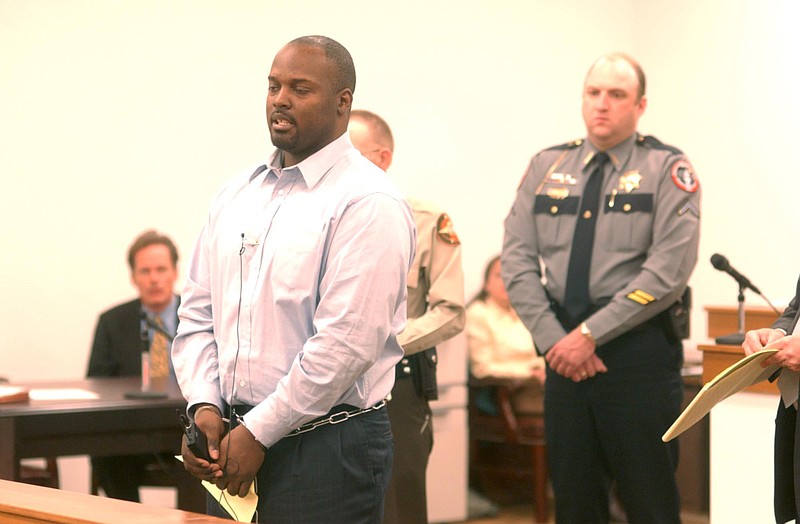When Sheila Manis learned her husband, Ira, was likely among the hundreds of bodies tossed in fields or left in holes to decay in the open, she hated the man who police said was responsible.
Fourteen years ago, Ray Brent Marsh, a quiet crematory director who gave up a promising football career at the University of Tennessee at Chattanooga to run his family business, became one of the most despised people in Walker County, Ga., when investigators discovered he had stopped cremating bodies and was stowing them on the family property.
The story became international news as 334 bodies in various stages of decomposition were discovered on the Marsh property in Noble - some thrown in pits, others found in caskets or on floors wearing hospital gowns or stacked high, dressed in their finest suits and dresses.
In response to the discovery, state regulators nationwide rushed to pass stricter laws regulating crematories. Georgia shelled out millions for cleanup and recovery and made it a crime to throw out a corpse.
Families tried to make sense of what they found out, grieving that Marsh had taken something sacred - dignity - from their loved ones that couldn't be regained.
Now 14 years later, Marsh, 43, was released Wednesday from Central State Prison in Bibb County, Ga., after serving the full length of his 12-year prison term. He was sentenced to serve 75 years on probation.
Manis said she hopes families have been able to forgive him and go on with their lives the same way she has.
"I'm really excited that he is free," Manis said. "It's time. The man has served his time. People should just leave him alone and let him be."
Marsh, who earned several degrees in theology while he was in prison, has never given a public explanation for why he did what he did. But his attorney, McCracken Poston, has argued for years and wrote in a letter requesting early release to the parole board that Marsh was affected by mercury poisoning from being exposed to the fumes in the crematory.
On Wednesday, Poston asked for the community to forgive Marsh and offer him privacy as he reunites with his family, including his 14-year-old daughter, who was a toddler when he went to prison.
But Manis said she was able to forgive Marsh years ago after she saw him for the first time in court.
In 2004, when Marsh was led into court dressed in body armor to plead guilty to 787 felony charges, the crowds jeered and booed, waved photos in his face, while some people even spat at him.
After he told the judge he was guilty, Marsh asked if he could turn and face the families he had wronged.
"The answers that many of you have come here today to hear, I cannot give you," Marsh read off of a piece of paper to the crowd in the packed courtroom. "Not for a lack of desire to give those answers, but for a lack of answers. For those individuals I've harmed emotionally as a result of my actions, I apologize."
As Marsh spoke, Manis stopped thinking about her husband of 21 years and began to think about her 18-year-old son. Marsh was a son, and she thought about how he didn't want to run the family business but had done so for his mother.
"Any son that loves his mother will do anything he can for her," she thought.
Looking at Marsh, she didn't believe he had discarded the bodies because of any ill intent, he just didn't do his job. She realized it was exhausting to keep waking up every morning and hating him. She told her three teenage children what she was thinking, and they agreed.
While many families argued Marsh should spend the rest of his life in prison and the state was only trying to save money by avoiding a trial, Manis began to think 12 years' imprisonment was too long a sentence.
Three months after Marsh's hearing, about two dozen relatives testified for six hours at his sentencing hearing.
"They were treated like trash in that junkyard he called a cemetery," said Pam Pitre, whose brother was found severely decomposed on the property.
Natasha Mann, whose father was found, said, "I keep asking myself why or how you did this to my daddy, but the answers I come up with sicken me."
Tim Mason, whose father's body was the first discovered, said he would forgive Marsh if asked. The body of Mason's mother was never found.
When Manis stood to read her statement the judge had to hush the crowd.
"This totally consumed my life for more than a year," she said. "I kept waiting for this so-called closure, but it never came. Then one day, I came to the realization that I would never find it as long as I was carrying this hate and anger around inside me."
"I think we have all been punished enough and I include you [Marsh] in that statement. If it were up to me, you would go home today."
In the years since Marsh was sentenced, his mother and sister were arrested and then the charges dismissed. Family members have worried that there are other bodies that were never found, and one relative wrote a book recounting the conspiracies. Mason said that, while he's still disturbed that his mother was never found, he's gone on and Marsh's release doesn't affect him.
On Wednesday, Manis texted Marsh's attorney.
"Tell Brent I'm glad he's out and best wishes."
Contact staff writer Joy Lukachick Smith at jsmith@timesfreepress.com or 423-757-6659.

